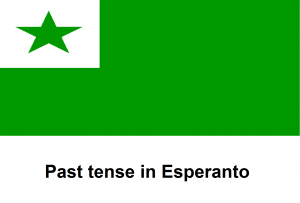Difference between revisions of "Language/Esperanto/Grammar/Past-Tense"
Jump to navigation
Jump to search
(Past tense in Esperanto) |
|||
| Line 1: | Line 1: | ||
[[File:Past tense in Esperanto.png|alt=Past tense in Esperanto|thumb|Past tense in Esperanto]] | |||
. | |||
Hello everybody, | |||
In today's lesson you will learn some useful vocabulary about '''¨PAST TENSE¨''' in Esperanto. | |||
Feel free to edit this page by adding new words and expressions ! | |||
Good learning ! :) | |||
. | |||
. | |||
== '''Some explanation for Past tense in Esperanto''' == | |||
'''<big><u>OBS.: In the infinitive form; change the last letter (-i) by (-is) to form the Past Tense</u></big>''' | |||
{| class="wikitable sortable" | |||
!<big>'''ENGLISH'''</big> | |||
!<big>'''PRONUNCIATION'''</big> | |||
'''<big>ENGLISH</big>''' | |||
!'''<big>ESPERANTO</big>''' | |||
!'''<big>PRONUNCIATION</big>''' | |||
'''<big>BRAZILIAN</big>''' | |||
'''<big>PORTUGUESE</big>''' | |||
!'''<big>BRAZILIAN</big>''' | |||
'''<big>PORTUGUESE</big>''' | |||
|- | |||
| | |||
| | |||
| | |||
| | |||
| | |||
|- | |||
|to have | |||
| | |||
|'''<big>havi</big>''' | |||
| | |||
|ter | |||
|- | |||
| | |||
| | |||
| | |||
| | |||
| | |||
|- | |||
|I had | |||
| | |||
|'''<big>Mi havis</big>''' | |||
| | |||
|eu tinha | |||
|- | |||
|You had | |||
| | |||
|'''<big>Vi havis</big>''' | |||
| | |||
|Você tinha | |||
|- | |||
|He had | |||
| | |||
|'''<big>Li havis</big>''' | |||
| | |||
|Ele tinha | |||
|- | |||
|She had | |||
| | |||
|'''<big>Ŝi havis</big>''' | |||
| | |||
|Ela teve | |||
|- | |||
|We had | |||
| | |||
|'''<big>Ni havis</big>''' | |||
| | |||
|Nós tínhamos | |||
|- | |||
|You had | |||
| | |||
|'''<big>Vi havis</big>''' | |||
| | |||
|Você tinha | |||
|- | |||
|They had | |||
| | |||
|'''<big>Ili havis</big>''' | |||
| | |||
|Eles tinham | |||
|- | |||
| | |||
| | |||
| | |||
| | |||
| | |||
|- | |||
| | |||
| | |||
| | |||
| | |||
| | |||
|} | |||
In Esperanto, expressing past tense is changing the "-i" of a verb to "-is". | In Esperanto, expressing past tense is changing the "-i" of a verb to "-is". | ||
*I came. - Mi venis. | *I came. - Mi venis. | ||
*I ate an egg - Mi manĝis ovon. | *I ate an egg - Mi manĝis ovon. | ||
Revision as of 03:17, 10 April 2020
.
Hello everybody,
In today's lesson you will learn some useful vocabulary about ¨PAST TENSE¨ in Esperanto.
Feel free to edit this page by adding new words and expressions !
Good learning ! :)
.
.
Some explanation for Past tense in Esperanto
OBS.: In the infinitive form; change the last letter (-i) by (-is) to form the Past Tense
| ENGLISH | PRONUNCIATION
ENGLISH |
ESPERANTO | PRONUNCIATION
BRAZILIAN PORTUGUESE |
BRAZILIAN
PORTUGUESE |
|---|---|---|---|---|
| to have | havi | ter | ||
| I had | Mi havis | eu tinha | ||
| You had | Vi havis | Você tinha | ||
| He had | Li havis | Ele tinha | ||
| She had | Ŝi havis | Ela teve | ||
| We had | Ni havis | Nós tínhamos | ||
| You had | Vi havis | Você tinha | ||
| They had | Ili havis | Eles tinham | ||
In Esperanto, expressing past tense is changing the "-i" of a verb to "-is".
- I came. - Mi venis.
- I ate an egg - Mi manĝis ovon.
